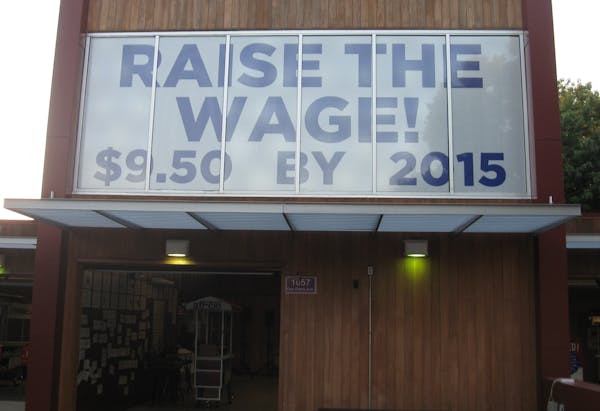My first experience at labor was at about age 7 in my father's awning shop in Chicago. "Joey," he'd say, "sweep the floor." And, of course, I did.
Now, nearly 70 years later, as another Labor Day rolls, it seems a good time to reflect on labor, the different kinds of work and the economy.
The economy has been pretty good for well-off Americans. The stock market has been at all-time highs. I have watched my nest egg invested in stocks and bonds grow beyond my wildest dreams — steady gains giving me more money than I need in my senior years.
At the same time, I see young families at the bottom half of the economy struggling to make ends meet with low wages, high tuitions and scarce job training programs.
Some of my rich friends speak of how hard they worked, and how they deserve all the gains of the market with lower taxes from investments than workers pay for wages. That would make more sense if those at the bottom were making enough money to buy what they need.
They work hard, too, cutting down trees, picking up garbage and competing with foreign labor to earn their meager paychecks. They find themselves making half what they made before the Great Recession, if they are lucky enough to have a job.
So what are we doing to solve this labor-income problem? It seems we are taking a very dangerous route, that of entitlements.
Entitlement growth per capita has been nearly twice as fast as income growth per capita for the last 50 years (U.S. Bureau of Economic Analysis, U.S. Department of Labor, U.S. census). Entitlements have grown from 7.8 percent in 1969 to 17.6 percent in 2009. I'm sure it's gotten even worse in the last four years. We've got to not only stop the trend but try to reverse it with more people working.
Sure some of this is inevitable with the world labor market as wages, like water, seek a common level. However, there are some things we can do to make "the rising tide lift all boats."
First, we should try our best to make the labor force strong and smart, with the right attitude. Parents need to teach their kids everything from nature, science and getting along with others.
One of the most important lessons they should teach is how to work; if the kids want money, they'd better work for it. For most of us, only work produces wealth and money. Sure, there might be temporary help from their family, friends or the community or government, but working people really produce the goods and services, and everyone should be part of the production, not just consumption.
Second, let's never criticize the poor without looking at the faults of the rich. It should not be everyone for themselves; we are all in this together.
There is an too-large percentage of rich who have not labored for the money. "Trust babies," excessive compensation and unearned inheritance make some underuse their talents and think they've earned their status in life. If work produces wealth, it holds for the rich and talented even more than for the poor and less advanced to use their talents for good.
Even businesspeople who are working should be reminded that the bottom line cannot be healthy unless the business has a competent workforce earning a living wage — and customers must be given a decent price ensured by competition, so they can get a true value from their product. And, yes, taxes must be paid so we have transportation systems for their products, a legal system to prevent fraud and corruption, and an educational system providing skilled workers.
And poverty and idle time breed consequences in desperation, burglary, drug use, prostitution and other crimes. For some nonviolent criminals, there's truth to the saying "send them to Yale, not jail; it's cheaper."
Third, let's bolster labor by promoting empowerment over "entitlements." Empowerment gives workers dignity as well as the ability to make money.
Let's save public assistance for the truly needy, the blind, the lame, and those with invisible disabilities. Let's not be naive turkeys and deny that some people (rich or poor) can be lazy; we shouldn't reward laziness but should provide incentives to work.
Targeted government stimuli like the ones planned for the medical cooperation between Rochester's Mayo Clinic and Twin Cities will do far more for the labor force of middle- and low-income Minnesotans than will more government entitlements.
Finally, let's not kid ourselves into thinking that all people start off equally and are nourished equally. This summer I had two Yale interns helping with the MicroGrants' program. They not only had good looks and high intelligence, but they were about to be given six "enrichment days" (for example, a trip to the Catskills mountains to develop bonding and survival skills) when they returned to their Ivy League school. In contrast, most of the recipients of a MicroGrant didn't even know where Lake Harriet is. So much for their enrichment days.
The bottom 20 percent will never catch up, but most are eager to work. Let's give them the chance.
It's not altruism; it's good business.
------------------
Joe Selvaggio is president of MicroGrants and founder of the Project for Pride in Living.
Aid votes show Congress can still work
Readers Write: Cellphones in schools, potholes, child abuse, good journalism


